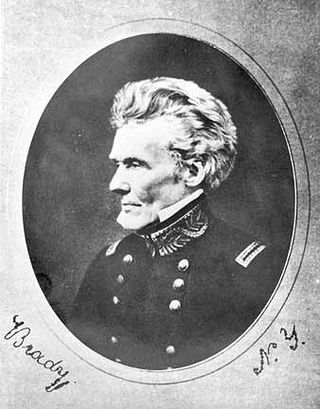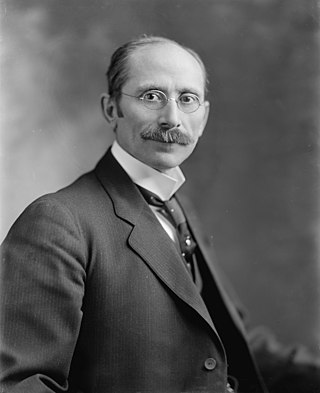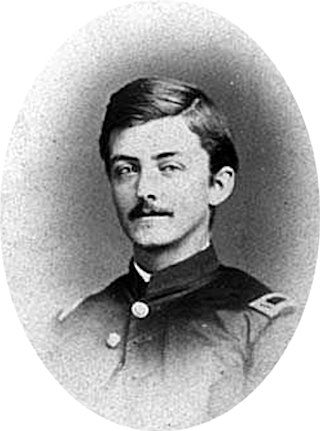
Alexander Ramsey was an American politician, who became the first Minnesota Territorial Governor and later became a U.S. Senator. He served as a Whig and Republican over a variety of offices between the 1840s and the 1880s.

Willis Arnold Gorman was an American lawyer, soldier, politician, and a general in the Union Army during the American Civil War.

William Rainey Marshall was an American politician. He was the fifth Governor of Minnesota from January 8, 1866, to January 9, 1870, and was a member of the Republican party. He served as an officer in the 7th Minnesota Volunteer Infantry Regiment during the American Civil War (1861–1865).

Oscar Wilder Underwood was an American lawyer and politician from Alabama, and also a candidate for President of the United States in 1912 and 1924. He was the first formally designated floor leader in the United States Senate, and the only individual to serve as the Democratic leader in both the Senate and the United States House of Representatives.

Fort Ridgely was a frontier United States Army outpost from 1851 to 1867, built 1853–1854 in Minnesota Territory. The Sioux called it Esa Tonka. It was located overlooking the Minnesota River southwest of Fairfax, Minnesota. Half of the fort's land was part of the south reservation in the Minnesota river valley for the Mdewakanton and Wahpekute tribes. Fort Ridgely had no defensive wall, palisade, or guard towers. The Army referred to the fort as the "New Post on the Upper Minnesota" until it was named for two Maryland Army Officers named Ridgely, who died during the Mexican–American War.

Edmund Pendleton Gaines was a career United States Army officer who served for nearly fifty years, and attained the rank of major general by brevet. He was one of the Army's senior commanders during its formative years in the early to mid-1800s, and was a veteran of the War of 1812, Seminole Wars, Black Hawk War, and Mexican–American War.

George Washington Parke Custis was an American antiquarian, author, playwright, and plantation owner. He was a veteran of the War of 1812. His father, John Parke Custis served in the American Revolution with then-General George Washington. John Parke Custis died after the Battle of Yorktown that ended the American Revolution.

Joseph Little Bristow was a Republican politician from the American state of Kansas. Elected in 1908, Bristow served a single term in the United States Senate where he gained recognition for his support of several political causes of the Progressive era. In retirement, Bristow was a farmer in Annandale, Virginia.

The 5th Minnesota Infantry Regiment was a Minnesota USV infantry regiment that served in the Union Army in the Western Theater of the American Civil War and Dakota War of 1862. The regiment distinguished itself serving in its home state and the south, particularly at the Battles of Fort Ridgely, Corinth and Nashville.

Ambrose Tighe was an American lawyer, politician, and academic from Minnesota. He was one of the five co-founders of William Mitchell College of Law.

John O'Fallon was a businessman, philanthropist, and military officer, a nephew of the explorer William Clark. During the 19th century he rose to become the wealthiest person in St. Louis, Missouri. The cities of O'Fallon, Illinois and O'Fallon, Missouri are named after him. In 1857, he donated over $1 million to establish the O'Fallon Institute at what is now Washington University in St. Louis.

Thomas Parke Gere was a Union Army officer who received the Medal of Honor for his actions during the Battle of Nashville in the American Civil War.
General Thomas Adams Parke, was a career officer in the Royal Marines. Associated with the Royal Marine Artillery (RMA) of the nineteenth century Royal Marines; he was for many years commandant of that corps. Toward the end of his long and distinguished service, he led the Woolwich Division of the Royal Marines as Colonel Commandant.

Charles Powell Adams was a Colonel in the Union Army, physician and politician. He was a territorial house member and a senator in the Minnesota legislature, and also served as mayor of Hastings, Minnesota, for one term. During the Civil War, he fought at the Battle of Malvern Hill, the Battle of Antietam and the Battle of Gettysburg, where he was severely wounded.
Seaborn F. Kennamer was a state legislator in Alabama. He was born in Kennamer Cove. He had 9 children. He served in the legislature in 1869 and 1870 representing Marshall County, Alabama and later served as postmaster of Kennamer Cove. He married Bettie Mitchell from Tennessee in 1869 and farmed Winesap apples.
Whitley Thomas Ewing, commonly known as W.T. Ewing, was an American political organizer, physician, and postmaster. Ewing who was a Union Army supporter, worked as a Republican Party organizer after the American Civil War. Historian Walter Lynwood Fleming described him as one of the "Moulton Leaguers", who first organized the "radical party" in northeastern Alabama in 1865, and active in politics in Baine County, Alabama.
Datus Ensign Coon (1831–1893) was a newspaper publisher, Union Army officer during the American Civil War, planter, and state politician in Alabama. He was a delegate to the 1875 Alabama Constitutional Convention and a fraternal order of veterans president in San Diego, California. He served as a state legislator during the Reconstruction era in Alabama. representing Dallas County, Alabama in the Alabama House of Representatives. He served on investigating committee evaluating corruption allegations against U.S. Senator George E. Spencer.
Nelson Green Gill was a state legislator and school organizer in Mississippi. He organized a school for African American students in Holly Springs, Mississippi. Mrs. Gill was also involved with the school. He represented Marshall County, Mississippi in the Mississippi House of Representatives in 1874 and 1875. He was white. He was a Republican.
Lock E. Houston was a judge and state legislator in Mississippi. He served as Speaker of the Mississippi House of Representatives. He served in the Mississippi House during the American Civil War.
Wyatt C. Thomas was a newspaperman, state legislator, and judge in Arkansas.













